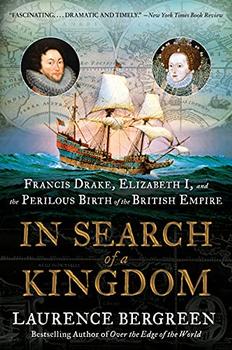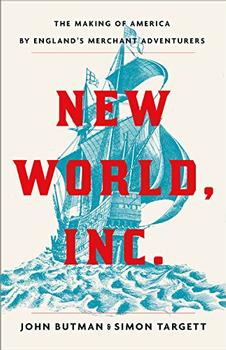Summary | Excerpt | Reviews | Beyond the book | Read-Alikes | Genres & Themes | Author Bio

Francis Drake, Elizabeth I, and the Perilous Birth of the British Empire
by Laurence BergreenIn this grand and thrilling narrative, the acclaimed biographer of Magellan, Columbus, and Marco Polo brings alive the singular life and adventures of Sir Francis Drake, the pirate/explorer/admiral whose mastery of the seas during the reign of Queen Elizabeth I changed the course of history.
Before he was secretly dispatched by Queen Elizabeth to circumnavigate the globe, or was called upon to save England from the Spanish Armada, Francis Drake was perhaps the most wanted-–and successful-–pirate ever to sail. Nicknamed "El Draque" by the Spaniards who placed a bounty on his head, the notorious red-haired, hot-tempered Drake pillaged galleons laden with New World gold and silver, stealing a vast fortune for his queen-–and himself. For Elizabeth, Drake made the impossible real, serving as a crucial and brilliantly adaptable instrument of her ambitions to transform England from a third-rate island kingdom into a global imperial power.
In 1580, sailing on Elizabeth's covert orders, Drake became the first captain to circumnavigate the earth successfully. (Ferdinand Magellan had died in his attempt.) Part exploring expedition, part raiding mission, Drake's audacious around-the-world journey in the Golden Hind reached Patagonia, the Pacific Coast of present-day California and Oregon, the Spice Islands, Java, and Africa. Almost a decade later, Elizabeth called upon Drake again. As the devil-may-care vice admiral of the English fleet, Drake dramatically defeated the once-invincible Spanish Armada, spurring the British Empire's ascent and permanently wounding its greatest rival.
The relationship between Drake and Elizabeth is the missing link in our understanding of the rise of the British Empire, and its importance has not been fully described or appreciated. Framed around Drake's key voyages as a window into this crucial moment in British history, In Search of a Kingdom is a rousing adventure narrative entwining epic historical themes with intimate passions.
Bergreen rightly credits Drake and his relationship with the brilliant Elizabeth for the role he played in this drama. Sometimes the author is a little too effusive in his praise — for example, he dismisses every sailor who criticized Drake as a jealous malcontent rather than considering if a money-hungry pirate was perhaps difficult to work with. A more nuanced view of his sources would have improved his analysis overall. But these are minor blemishes in an adventure for the ages that had repercussions well into modern times...continued
Full Review
 (1063 words)
(1063 words)
(Reviewed by Rose Rankin).
In the United States, the term "colonies" typically conjures images of pilgrims eking out homesteads and log cabins in the woods, or soldiers in tri-cornered hats fighting the mighty British at the birth of the American republic. Yet, the colonization of the "New World," as Europeans called it, began well before these early settlements in New England. Starting with Columbus's initial voyage, colonization of the Americas was driven by Spanish and Portuguese economic forces, eventually drawing in most European nations and West African polities, with cataclysmic consequences for people around the world.
The quest for gold was always a primary goal for the early European explorers, and with the conquest of the Aztecs in 1519, Hernán ...

If you liked In Search of a Kingdom, try these:

by Marie Arana
Published 2020
Against the background of a thousand years of vivid history, acclaimed writer Marie Arana tells the timely and timeless stories of three contemporary Latin Americans whose lives represent three driving forces that have shaped the character of the region: exploitation (silver), violence (sword), and religion (stone).

by John Butman, Simon Targett
Published 2018
Three generations of English merchant adventurers--not the Pilgrims, as we have so long believed--were the earliest founders of America. Profit-not piety-was their primary motive.